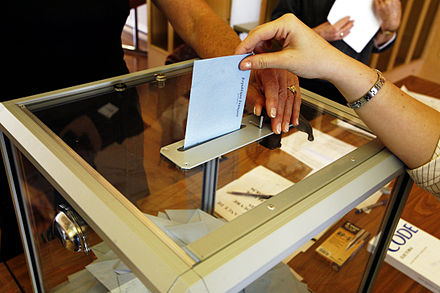AP Comparative Government 🗳️
90 resourcesSee Units
Multiple Choice Practice for Party and Electoral Systems and Citizen Organizations
Welcome to Unit 4 AP Comparative Government Multiple Choice Questions! Grab some paper and a pencil 📄 to record your answers as you go. You can see how you did on the Unit 4 Practice Questions Answers and Review sheet once you're done. Don't worry, we have tons of resources available if you get stumped 😕 on a question. And if solo study is not your thing, join a group in Hours!
Not ready to take a quiz yet? Start studying unit 4 Here: Intro to Unit 4

Image From Wikipedia.
Facts about the test: The AP Comp Gov exam has 55 multiple choice questions and you will be given 60 minutes to complete the section. That means it should take you around 15 minutes to complete 15 questions.
*The following questions were not written by College Board and although they cover information outlined in the AP Comparative Government Course and Exam Description the formatting on the exam may be different.
1. Which of the following is true about Iran's political party system?
A. Parties have ethnic quotas that affect representation in Iran's federal legislature.
B. One party controls the legislature.
C. Iran lacks formal political party structures.
D. Iran has a multiparty system that is dominated by a religious party.
2. Which countries have a degree of competition within multiparty systems?
A. Nigeria and Russia
B. Mexico and the UK
C. Mexico and Nigeria
D. Nigeria and the UK
3. Which of the following is an implication for competitiveness of the electoral process in Nigeria and Iran?
A. Iran's Guardian Council which encourages free and fair elections, and Nigeria's pattern of the incumbent winning.
B. Nigeria's independent electoral commission, and Iran's limits on who can run for office.
C. Both countries ban women from running in elections.
D. Nigeria's quotas for minority groups, while Iran reserves no seats for specific groups.
4. How are legislative members chosen in China?
A. The National People's Congress indirectly selects members through local elections.
B. The National People's Congress vets candidates that run for office to reduce competition.
C. Members are directly elected in single-member districts by plurality.
D. Members are appointed by regional governors.
5. What is NOT an advantage of a proportional representation electoral system?
A. Proportional representation can promote two-party systems which allows for greater accountability.
B. Proportional representation results in all votes being translated to seat representation.
C. Proportional representation can increase the number of women and minority candidates.
D. Proportional representation can promote a multiparty system which allows for minority party representation.
6. In which two focus countries do runoff elections occur if the presidential candidate does not win an absolute majority?
A. Russia and Nigeria
B. Russia and Iran
C. Iran and Mexico
D. Nigeria and Mexico
7. Which of the following is NOT an example of Mexico's transition away from a one-party dominant state?
A. Eliminating el dedazo, the process of the incumbent pointing to their successor
B. Establishing the National Electoral Institute
C. Banning the PRI Party from nominating candidates in the presidential elections
D. Privatizing state-owned corporations to decrease patronage
8. Which of these countries has had a dominant-party system since 2000?
A. Nigeria
B. The United Kingdom
C. Iran
D. Russia
9. Which of the following accurately compares social movements?
A. Both Iran's Green Movement and Mexico's Zapatista movement primarily responded to socioeconomic inequality.
B. In Nigeria, MEND protested unjust methods of oil distribution, while Iran's Green Movement protests electoral corruption.
C. Mexico's Zapatista movement primarily advocated for fair elections, while Nigeria's MOSOP favored the establishment of an Islamist state.
D. Iran's Green Movement primarily favored separatism, while Nigeria's Boko Haram advocates for Shari'a law.
10. Which of the following best describes pluralist systems?
A. They use single peak associations to represent the business sector
B. They support economic policies that are developed and run by the state.
C. They allow the state to maintain control over citizen input and participation.
D. They promote competition among autonomous groups not linked to the state
11. Which of the following states have transitioned from a corporatist to pluralist system?
A. Mexico
B. Iran
C. Russia
D. United Kingdom
12. Which of the following is a consequence of one-party rule in China?
A. CCP has made concessions to social movement demands.
B. Corporations have fought against regulations imposed by the CCP.
C. Minor parties have limited influence on policy making in China.
D. Minor parties have formed groups to challenge the CCP's dominance.
13. Which of the following best explains why the Chinese government allows some political protests?
A. To act as a release valve for the public
B. To open political discourse
C. To spread political information
D. To promote democratization among citizens
14. In which type of system does the government control policy making through state-sanctioned groups?
A. Pluralist systems
B. Corporatist systems
C. Democratic systems
D. Authoritarian systems
15. For most of its history, the Institutional Revolutionary Party (PRI) in Mexico has been
A. a religious party
B. an ethnic party
C. a dominant party
D. A left-wing party
Time to Check Your Answers on Unit 4 Practice Questions Answers and Review! 🙌
Browse Study Guides By Unit
👑Unit 1 – Political Systems, Regimes, & Governments
⚖️Unit 2 – Political Institutions
🙋♀️Unit 3 – Political Culture & Participation
🐘Unit 4 – Party, Electoral Systems, & Citizen Organizations
🏗Unit 5 – Political & Economic Changes & Development
✏️Frequently Asked Questions
📝Exam Skills

© 2023 Fiveable Inc. All rights reserved.